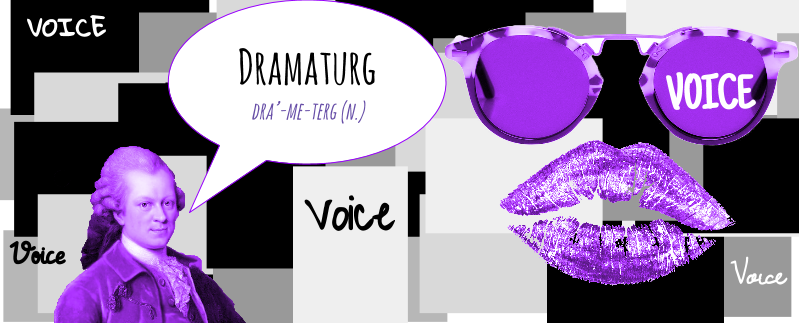Finding My Voice as a Dramaturg
- thegrapplertts
- Oct 19, 2021
- 4 min read

Graphic by Danielle Szabo
By Mariah Schultz, Associate Editor
I’ve always been someone who listens very carefully to others, taking my cues of where to go and what to do. Being more of a follower than a leader, I felt it natural that my future career position would be similar. I felt comfortable with pulling the strings behind the background, but never stepping out too far to put my neck on the line (I was the woman behind the mask, or curtain if you will). I had always managed to keep up this façade throughout grade school and didn’t expect college to be any different.
Coming into college pursuing a degree in theatre, I knew a great deal of jobs in the field required one to be vocal. Acting was obvious and I had had my fill in middle school and high school, so that was out. Directing seemed like a lot of pressure and took a certain specified version of seeing things that I didn’t feel I had the time or patience for. Although the designers and stage managers were typically quieter, I couldn’t bear dealing with responsibilities like math, not being clumsy on (or off) the stage, or making sure nobody died. I thought I was at a loss until I discovered dramaturgy.
Dramaturgy had everything I was looking for. I saw it as getting to read, discuss, and provide advice on how to perform plays. It was being the confidante of the director, but with none of the pressure of directing and having the respect of others because they think you literally know everything. The best part was you weren’t expected to be loud! You weren’t expected to take risks or have to introduce new ideas. You were simply supposed to be present to answer any questions, but other than that just to sit and soak up the process through the lens of the playwright’s eyes. I had it all figured out, that is until I started my dramaturgy classes at the Theatre School at DePaul.
I was in for a whirlwind of new possibilities. Dramaturgy is far from remaining silent and blending into the background. It was always making one’s self heard as well as all of the other perspectives in the room. It was stepping in and offering advice and possible tasks to accomplish if the director feels it is necessary. It was to be confident, assertive and making choices, three things I had never found myself being good at.
When I made this discovery of what a dramaturg is capable of being, I started to rethink everything I once knew of dramaturgy. It felt as if this profession I had been aiming to be in was suddenly more than I was capable of being. I didn’t know if I could do it anymore. I began to compare myself to others who seemed to have better ideas than mine, spoke when I had nothing to say, and was willing to present their ideas when I was afraid that mine weren’t even worth mentioning.
Despite my lapse into self-deprivation, I began to slowly build myself up by realizing that a dramaturg is capable of being loud, confident, and bold in their ideas, but the true art lies in finding the balance between speaking up and being silent. Just as it’s not always right for a director or actor to be directing all of the conversations around their ideas, the same applies to my position as well. I may not have ideas all the time or even the best one in the room, but I can still have a positive attitude and learn from my fellow collaborators how they go about their own processes.
I think it’s an important thing to realize not just for dramaturgs, but for all artists that our creative process is a constant metamorphosis, not just one complete transformation. There is not one point where we completely change and become the perfect, qualified artists we can be. I think we have our peaks, lows, and in-betweens, but in these in-betweens, we’re not standing still. We’re observing, gathering, and growing in order to make those big artistic leaps that will make or break us. This confidence is also a constant struggle to keep up with. Once you’ve found it, it’s tested, and you will gain it more you push yourself to keep going. While you may not always have support from others in the process, you have to learn to support yourself even if you are the only one in your corner.
So, yes I’ve learned to speak up more, gained more confidence in my ideas, and have become more willing to communicate and exchange ideas with others, but it doesn’t mean I’ve now become the most successful I can be. I still have ways to go on my path. I’m just getting started. Deep down I still see myself as that quiet, inquisitive girl just wanting to watch plays and talk about them with the world. I’m still me, but perhaps now I can see that girl doing more. To not hide so much behind the plays but create her own. To reach out to others who are in need as well but can’t bear to ask for it. To climb out of my own secret world and into another. I’m a different me now and I don’t think there’s anything wrong with that.



Comments